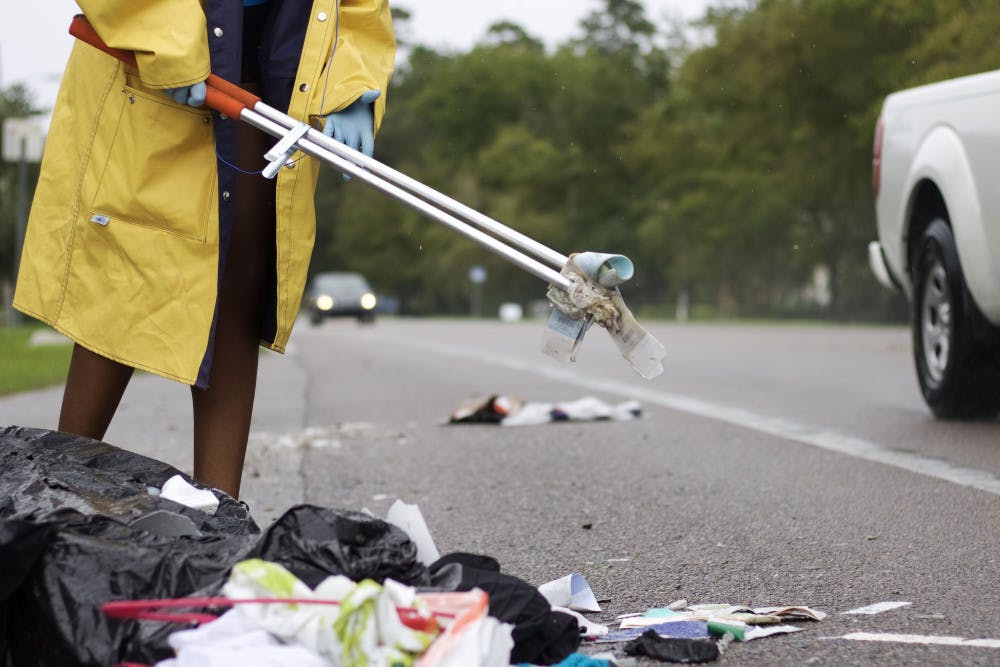Gainesville’s plastic ban ended before it ever started.
The Gainesville City Commission voted 4-2 on Thursday to repeal an ordinance passed earlier this year banning the use of plastic bags and polystyrene foam containers. The decision came after the 3rd District Court of Appeals sided with the Florida Retail Federation in a case against Coral Gables regarding a similar plastic ban.
On July 15, Gainesville received a letter from the same lobbying group asking the city to repeal the ordinance and threatening legal action if not done so within 60 days, according to city documents.
The decision in the Coral Gables case came after a three-year legal battle with the Federation. The appellate court ruled that the city’s plastic ban was deemed unconstitutional and violates section 500.90, which preempts local governments from enacting ordinances banning single-use plastics.
District 4 City Commissioner Adrian Hayes-Santos said he blames Publix.
“For years now, Publix has been the main force at the state legislature,” he said. “They’re hiding behind the Florida Retail Federation in trying to prevent cities from being able to protect the environment.”
Publix provides more than half of the federation’s funding, according to state campaign finance documents. In the 2018 general election the Florida Retail Federation received a total of $690,552 in contributions. Publix donated $500,000 of the total.
The Alligator reached out to Dwaine Stevens, a regional Publix spokesperson. Stevens ignored interview requests and did not respond to specific questions about policies.
Instead, he provided the following statement that was given to other news organizations and appears verbatim on Publix’s website:
“At Publix, our goal is to meet today’s needs without compromising what is essential for tomorrow. Simply stated, this means taking care of people and minimizing impact to our planet while remaining profitable.
Sustainability is ingrained in our culture and represented in our Mission Statement through valuing our associates, serving our customers, enhancing our ties to the communities we serve, conserving natural resources, and ensuring economic stewardship for our stockholders.”
Stevens added that Publix will comply with all ordinances and laws in all areas it operates in.
The supermarket chain’s political involvement goes beyond its close relationship with the Florida Retail Federation.
In 2016, the Lakeland-based company gave Florida lawmakers $1 million to pass legislation that would prevent local governments from banning single-use plastics, according to the Miami Herald.
Hayes-Santos said that as one of the largest employers and grocery store chains in the state, Publix should be setting an example.
“They need to be a leader in our state in order to help protect our communities and our environment,” he said.
Gainesville has been attempting to reduce single-use plastics for more than 10 years.
The city’s efforts to curb plastic use date as far back as 2008, when local grocery stores began offering reusable/recyclable options, according to Alligator archives. In Aug. 2018, the city began its push to become waste free by 2040.
District 3 City Commissioner David Arreola described the legal dispute as “disgusting.”
“When the people wanted to use the democratic process, those corporations used their money to suppress the democratic process by lobbying and paying off elected officials,” Arreola said. “It’s important for everyone to look at the businesses they shop at and start asking if they reflect our democratic values.”
Arreola said if Coral Gables decides to take the case to the Supreme Court, Gainesville may be willing to write an amicus brief.
“Given our notice of intent, that’s the path we’re going to take,” he said. “Of course, if Coral Gables decided to appeal, I’d be thrilled to offer Gainesville as a friend of the court.”
Although the commission chose to rescind the ordinance, Hayes-Santos said the city will be proceeding with other measures to reduce plastics that are in accordance with state law.
On Thursday, the commission approved a plastic straw ban, which is set to take effect Jan. 2020. Plastic straws are exempted from the laws cited in the Coral Gables case.
Another avenue is the regulation of single-use plastic bags and foam containers on city property, Hayes-Santos said.
He said he thinks Publix would shift gears if people put enough pressure on the business.
“Let the store managers know about your concerns,” he said. “I think that’s something that if enough people complain to the store managers about this, they may make some changes.”
A Greenpeace report released in June ranked retailers on a plastics scorecard, which determines a “baseline measurement of U.S. retailer’s sustainability performance on single-use plastics.”
Publix was ranked 15 out of 20, although none of the retailers surveyed received a passing score.
The report stated: “Especially given their brand recognition and/or sheer size, it is troubling that Publix (ranked 15th) ... had so little to offer.”
It added that aside from very little public information on their initiatives, they “appear to be stuck in the 1990s, with a large focus on recycling.”
Hayes-Santos said that if large corporations, such as Publix, “continue hiding in the shadows” behind lawmakers supporting these measures, the issue will only continue to worsen.
“Our state legislature should be putting the citizens and our state first, not the interests of Publix first,” he said.
A community service volunteer picks up litter along SW 20th Avenue Aug. 19.






